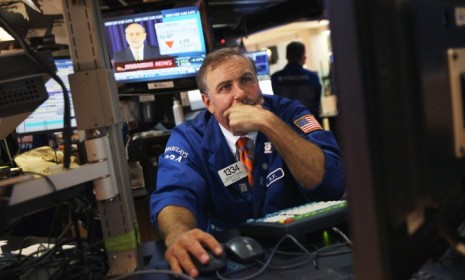'Operation Twist': Should the Fed do more to jumpstart the economy?
The central bank extends a modest program designed to stimulate growth, causing many analysts to bemoan the lack of more robust action

A free daily email with the biggest news stories of the day – and the best features from TheWeek.com
You are now subscribed
Your newsletter sign-up was successful
This week, the Federal Reserve extended the lifespan of "Operation Twist," a program designed to encourage economic growth by lowering the cost of borrowing for consumers and businesses. Over the next six months, the central bank will buy $267 billion worth of long-term Treasury securities, using the proceeds from an equivalent sale of short-term securities already on its balance sheet. (Buying up such a huge volume of Treasury securities will lower interest rates not just for Treasuries, but for other assets and loans undergirded by Treasuries, too.) The latest move comes amid signs that the recovery from the Great Recession is stalling, but despite Operation Twist's impressive price tag, it is being viewed by many analysts as only a modest response to the country's dire unemployment situation. Should the Fed do more?
Yes. The economy needs a bigger boost: Extending Operation Twist "was only just barely more than doing nothing," says Mark Gongloff at The Huffington Post. The Fed must "take the more radical step of" printing new money to buy up Treasuries and mortgage-backed assets, a process known as quantitative easing. That would "pump more cash into the economy," and jumpstart our faltering system. By bankrolling Operation Twist with the sale of short-term securities, the Fed is "simply running in place."
"In FOMC rate decision, the Fed does the absolute least it can do"
The Week
Escape your echo chamber. Get the facts behind the news, plus analysis from multiple perspectives.

Sign up for The Week's Free Newsletters
From our morning news briefing to a weekly Good News Newsletter, get the best of The Week delivered directly to your inbox.
From our morning news briefing to a weekly Good News Newsletter, get the best of The Week delivered directly to your inbox.
No. The Fed's solutions have failed: Neither Operation Twist, "nor the incredibly dangerous money-printing operation known by the innocent name" of quantitative easing, "have achieved much of anything," says John Crudele at the New York Post. The economy "is still growing at a measly 2 percent a year," and the only ones benefiting from the Fed's lower borrowing costs are Wall Street banks. The Fed's latest move is the very definition of insanity: "Doing the same thing over and over again and expecting different results."
But the Fed is laying the ground for more action: "It is unlikely that the Federal Reserve's efforts to boost the economy will end with 'Operation Twist,'" says Justin Lahart at The Wall Street Journal. The Fed says that the economy is growing slower than it had initially forecast, and that the unemployment rate will hover above 8 percent for the rest of the year. "Absent a turn for the better," more action is likely in the coming months.
"The Fed's soft launch of QE3"
A free daily email with the biggest news stories of the day – and the best features from TheWeek.com
Clearly, the Fed needs help from Congress: The main reason the Fed has stepped in is because Congress has "proved unwilling to attack the very real problems threatening the U.S. economy," says Bloomberg in an editorial. The Fed's move "is welcome news," but monetary policy band-aids aren't helping "those who need it most." Congress needs to pass short-term fiscal stimulus that will reach the less well-off, and combine it with a long-term deficit reduction plan to offset concerns about bloating the deficit.